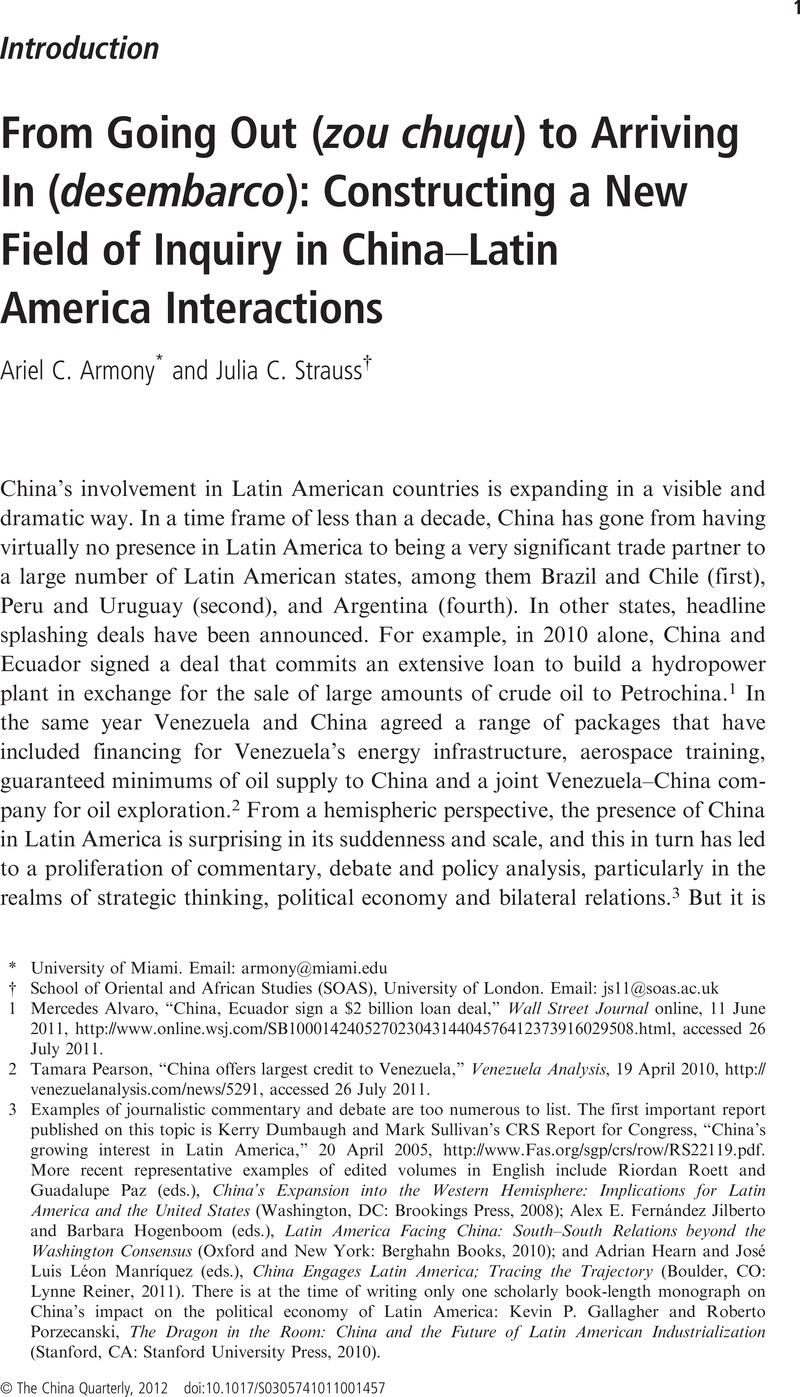Article contents
From Going Out (zou chuqu) to Arriving In (desembarco): Constructing a New Field of Inquiry in China–Latin America Interactions
Published online by Cambridge University Press: 29 March 2012
Abstract

- Type
- Introduction
- Information
- Copyright
- Copyright © The China Quarterly 2012
References
1 Alvaro, Mercedes, “China, Ecuador sign a $2 billion loan deal,” Wall Street Journal online, 11 June 2011, http://www.online.wsj.com/SB10001424052702304314404576412373916029508.html, accessed 26 July 2011Google Scholar.
2 Pearson, Tamara, “China offers largest credit to Venezuela,” Venezuela Analysis, 19 April 2010, http://venezuelanalysis.com/news/5291, accessed 26 July 2011Google Scholar.
3 Examples of journalistic commentary and debate are too numerous to list. The first important report published on this topic is Kerry Dumbaugh and Mark Sullivan's CRS Report for Congress, “China's growing interest in Latin America,” 20 April 2005, http://www.Fas.org/sgp/crs/row/RS22119.pdf. More recent representative examples of edited volumes in English include Roett, Riordan and Paz, Guadalupe (eds.), China's Expansion into the Western Hemisphere: Implications for Latin America and the United States (Washington, DC: Brookings Press, 2008)Google Scholar; Jilberto, Alex E. Fernández and Hogenboom, Barbara (eds.), Latin America Facing China: South–South Relations beyond the Washington Consensus (Oxford and New York: Berghahn Books, 2010)Google Scholar; and Hearn, Adrian and Manríquez, José Luis Léon (eds.), China Engages Latin America; Tracing the Trajectory (Boulder, CO: Lynne Reiner, 2011)Google Scholar. There is at the time of writing only one scholarly book-length monograph on China's impact on the political economy of Latin America: Gallagher, Kevin P. and Porzecanski, Roberto, The Dragon in the Room: China and the Future of Latin American Industrialization (Stanford, CA: Stanford University Press, 2010)Google Scholar.
4 Joseph, Gilbert M., “Close encounters: toward a new cultural history of US–Latin American relations,” in Joseph, Gilbert M., Legrand, Catherine C. and Salvatore, Ricardo D. (eds.), Close Encounters of Empire: Writing the Cultural History of US–Latin American Relations (Durham, NC: Duke University Press, 1998), pp. 5–8Google Scholar.
5 See Pew Research Center, Global Attitudes Survey (Washington, DC: The Pew Center, 2007; 2010)Google Scholar.
6 “Framing and claiming: contemporary globalization and ‘going out’ in China's rhetoric towards Latin America.”
7 “China, United States and hegemonic challenge in Latin America: an overview and some lessons from previous instances of hegemonic challenge in the region.”
8 “A view from afar: how Colombia sees China.”
9 See e.g. Romero, Simon, “Tensions over Chinese mining venture in Peru,” New York Times, 15 August 2010, p. A6Google Scholar.
10 “Mapping Chinese mining investment in Latin America: politics or market?”
11 See Wolf, Eric R., Europe and the People without History (Berkeley: University of California Press, 1982), pp. 230–31Google Scholar. See also Lee, Ching-kwan, “Raw encounters: Chinese managers, African workers, and the politics of casualization in Africa's Chinese enclaves,” in Strauss, Julia C. and Saavedra, Martha (eds.), China and Africa: Emerging Patterns in Globalization and Development (Cambridge: Cambridge University Press, 2010), pp. 77–96.Google Scholar
12 “A view from afar.”
13 “Online Chinese perceptions of Latin America: how they differ from the official view.”
14 Armony, Ariel C. and Schamis, Hector, “Babel in democratization studies,” Journal of Democracy, Vol. 16, No. 4 (2005), pp. 113–28CrossRefGoogle Scholar.
15 “Harnessing the dragon: overseas Chinese entrepreneurs in Mexico and Cuba.”
16 See O'Donnell, Guillermo, “Informal institutions, once again,” in Helmke, Gretchen and Levitsky, Steven, Informal Institutions and Democracy: Lessons from Latin America (Baltimore, CA: Johns Hopkins University Press, 2006), pp. 285–90Google Scholar.
17 Helmke and Levitsky, Informal Institutions and Democracy.
18 Armony, Ariel C., “The China–Latin America relationship: convergences and divergences,” in Hearn, Adrian H. and Manríquez, José Luis León (eds.), China Engages Latin America: Tracing the Trajectory (Boulder, CO: Lynne Rienner, 2011)Google Scholar.
19 “Harnessing the dragon: overseas Chinese entrepreneurs in Mexico and Cuba.”
20 “The China Policy Paper on Latin America and the Caribbean,” 5 November 2010, http://www.fmprc.gov.cn/eng/2xxx/t151-25.htm, accessed 8 October 2011.
21 “Chinese firms threaten Ecuador arbitration,” Reuters, 12 November 2010, http://www.reuters.com/article/2010/11/12/ecuador-energy-idUSN1215074320101112, accessed 14 July 2011.
22 “Who really benefits from China's trade with Latin America?” The Guardian, 16 February 2011, http://www.guardian.co.uk/global-development/poverty-matters/2011/feb/16/china-latin-america-trade-benefit, accessed 23 June 2011Google Scholar. See also Gonzalez, Carmen G., “China in Latin America: law, economics, and sustainable development,” Environmental Law Reporter, No. 40 (2010), pp. 10171–84Google Scholar.
23 US Embassy, Mexico DF, “Chinese VP Trip to Mexico – Journey Begins with a Five Step Proposal,” US Diplomatic Cables, Id. No. 09MEXICO701, 10 March 2010, http://www.wikileaks.nl/cable/2009/03/09MEXICO701.html, accessed 15 March 2011; US Embassy, Beijing, “Colombian views on trade relations with China,” US Diplomatic Cables, Id. No. 09BEIJING841, 30 March 2009, http://www.wikileaks.nl/cable/2009/03/09BEIJING841.html, accessed 15 March 2011. See Delgado, Antonio, “América Latina recela del papel de China,” El Nuevo Herald (Miami), 5 January 2011, p. 5AGoogle Scholar.
24 Jiang, Wenran, “Fuelling the dragon: China's rise and its energy and resources extraction in Africa,” The China Quarterly, No. 199 (2009), pp. 585–609CrossRefGoogle Scholar; Lee, Ching Kwan, “Raw encounters: Chinese managers, African workers and the politics of casualization in Africa's Chinese enclaves,” The China Quarterly, No. 199 (2009), pp. 647–66CrossRefGoogle Scholar.
- 35
- Cited by




